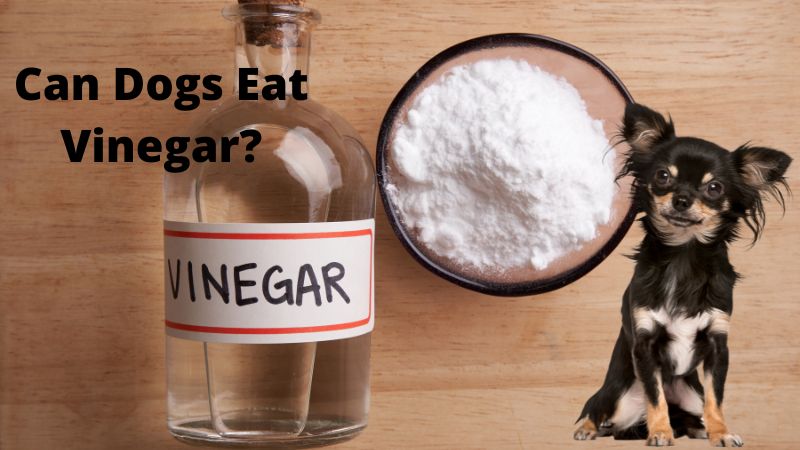
Can Dogs Eat Vinegar?
Over the years, pet owners have contacted me with various inquiries and questions. There is a question about giving the dog the “vinegar” you drink for your health.
As a natural ingredient, vinegar has been shown to have several health benefits in humans. As a fermented food, it is rich in amino and organic acids, such as citric acid and acetic acid, which are beneficial to the body.
Vinegar of this type is safe for dogs to drink. However, the same cannot be said about vinegar’s health benefits. Taking human rice or vinegar accidentally won’t harm you, but drinking it for your health won’t have a positive effect.
First of all, dogs have a completely different body structure than humans.
Humans cannot synthesize vitamins and essential amino acids. That nutrient must always be obtained through food.
Since dogs are carnivores, they can supplement all the nutrients in their bodies by eating animal meat, internal organs, bones, cartilage, etc. In contrast to humans, it can produce most of its vitamins and amino acids.
As a result, humans and dogs require different nutrients to function properly. In addition to high-quality protein, lipids, collagen, and calcium, dogs need other nutrients as well. Taking enough of these nutrients can keep you healthy.
Dogs are designed to eat these properly with most dog foods. As a result, vinegar is unnecessary for your dog’s daily routine. Isn’t taking vinegar a plus?
Is vinegar safe for dogs?
amino acid
One of the most famous ingredients in vinegar is amino acids. For dogs to survive, they need amino acids as nutrients, and if they are deficient in amino acids, their body functions may deteriorate, and at worst, their lives may be at risk.
If a dog is healthy, it will not have any problem producing amino acids because its body can make them. Still, vinegar is an effective food to feed dogs that may be deficient in amino acids due to some health conditions.
citric acid
Citric acid is another ingredient in vinegar that contributes to its sour taste. In humans, citric acid is an ingredient that promotes carbohydrate metabolism and is effective in improving stamina and recovering from fatigue.
Even though citric acid has a positive effect on humans, it has little effect on dogs’ health.
Citric and amino acids are not useless but do not affect health.
Dogs can be given vinegar of various types.
- Apple cider vinegar
- Black vinegar
- Cereal vinegar
- rice vinegar
There are many types of vinegar, but which one can be given to dogs? Vinegar does not need to be delivered to your dog.
Dogs don’t receive any health benefits from vinegar, and drinking vinegar doesn’t do them any good. Both apple cider and black vinegar are said to be beneficial to health.
Vinegar, on the other hand, does not have any adverse effects. Vinegar, however, contains several high-calorie ingredients, including sugar. Given the above points, giving vinegar to dogs is still unnecessary.
Despite this, even if you don’t intend to give your dog vinegar, it may still have been swallowed by him accidentally. The vinegar component at that time does not cause poisoning, so keep an eye on your physical condition.
Vinegar for your dog’s skin and training
Use vinegar for discipline.
Other than drinking vinegar, vinegar can also benefit your dog’s health in different ways. How about using vinegar to train your dog? It’s a method that’s been used for a long time, but have you ever heard of it?
You can use vinegar as an anti-discipline spray that can be used safely with a mist spray.
If scolding a dog that chews or barks in vain does not work, prepare diluted vinegar in a spray bottle.
There is also a story that spraying vinegar when you want to say no is more effective than scolding loudly.
Also, many children do not like vinegar because it’s sour, so you can train it naturally by making vinegar water and applying it when you eat it or spraying it.
In addition, many children do not like vinegar because it is sour, so you can train it naturally by applying vinegar water. Having trouble with discipline, How about a vinegar spray?
Using vinegar for skin care
Since vinegar is bactericidal, it can be used instead of disinfectant solutions since it has no particular effects on the body. Aside from its bactericidal properties, vinegar also has rinsing properties.
If you rinse with a strong smell after shampooing, even dogs who dislike rubbing their bodies on the ground will enjoy the vinegar rinse.
According to some sources, it benefits dogs who suffer from skin diseases such as bacterial dermatitis, pyoderma, and Malassezia. Furthermore, vinegar can be used to disinfect and sterilize your dog’s cage and carry case, which is harmless and non-toxic.
Natural ingredients, such as vinegar, are gentle on the skin and can be used more confidently than commercially available ones containing chemicals.
Other uses
There are other famous methods of using vinegar on dogs. For example, tartar removal can only be done at animal hospitals. However, if it has not accumulated that much yet or is about to become tartar, you can rub it with a mixture of vinegar and honey on the tartar to make it easier to remove.
It will only make it easier to remove, and you may not be able to remove it, so let’s try it as if you were worried about stains on your teeth.
Also, if you can’t get rid of ticks, you can put your dog in a bath or tub with vinegar and hot water to remove them naturally. However, if this is also first aid, get the correct treatment as soon as possible under a veterinarian.
Furthermore, as a countermeasure against the smell of markings and droppings, putting vinegar water in a mist and spraying it will exert a deodorizing effect. In addition, since it sterilizes at the same time, it is effective as a toilet discipline and marking countermeasure. In addition, using a cotton swab with a little vinegar is effective when cleaning the ears to prevent ear mites. Please try it if you like.
Vinegar for dogs: precautions
Spraying vinegar on your face can cause stains in your eyes. The vinegar smell is so irritating to dogs that it is used for training. Use it diluted with water if you want to use it as is. Otherwise, it will be too irritating.
Although vinegar does not adversely affect your health, you may be allergic to it, so visit the hospital if you experience vomiting or diarrhoea after touching vinegar.
Frequently Asked Questions
Can dogs eat vinegar and rice?
As the name suggests, rice vinegar, commonly used in vinegared rice, is made from rice, as its name suggests. As long as you give rice vinegar in small quantities, it is not harmful to dogs because it contains nutrients such as acetic acid, amino acids, and citric acid.
If you make vinegared rice with sugar or you use too much sugar in vinegar originally, there is no health problem for the dog if you give it a reasonable amount.
Can dogs eat Apple cider vinegar?
Yes, very good. Our goal is to take good care of our pets with natural products as much as possible, so apple cider vinegar is very good. Apple cider vinegar has many uses,
can dogs eat black vinegar
It is unlikely that black vinegar will cause any harm to your dog.
There are several poisoning symptoms.
As a result, you can give your black dog vinegar.
Just a few amounts.
Black vinegar is a type of fermented food.
is rich in amino acids such as citric acid and acetic acid and is recognized as
Healthy food for humans.
However, the unique smell of vinegar can
It’s irritating for dogs with a good nose.
Summary
In my opinion, dogs do not need vinegar as an ingredient. It is not necessary to force them to eat at all, so you can assume that vinegar-related products that claim to have health benefits for dogs, such as supplements, are ineffective since there is no need to force them to eat.
A small amount of lean beef or bird breast can also be added to your daily diet if you give vinegar to get an even greater effect. You shouldn’t worry if your dog licked vinegar, ate vinegared squid, or ate vinegared rice.
When you know that dogs require different nutrients than humans, you will know what is good and bad. If your dog and its owner eat the same food, they won’t be able to stay healthy with each other.
Owners use vinegar for each other’s health, and their dogs eat meat well.







Leave a Reply